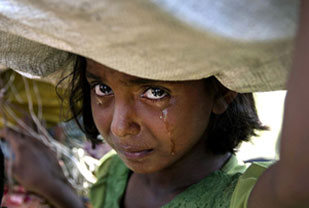Building A Responsible Sugar Supply Chain
Rights And Entitlements


Oxfam India’s Power of Voices Project (PvP) aims to ensure rights of informal sector worker specifically those engaged in sugar value chain. This is to be done through awareness building and knowledge support to improve their livelihoods and working conditions. The intervention also aims to to hold government and private sector accountable with regard to protection of workers and farmers rights and provision of protection mechanism for all. It also aims to promote more sustainable, inclusive and resilient agriculture trade and value chain that promote grassroots women’s rights and economic empowerment.
India is the second largest sugar producer in the world; Uttar Pradesh and Maharastra together contributes above 60% of total produce in the country. It is therefore of utmost importance to engage with rights of formal farm workers and small scale farmers. Their rights are not protected by legislation and regulations and they are often excluded from basic services and government support, which is mostly directed at large firms and export commodities. As part of the PvP initiative to build a responsible sugar supply chain, a comprehensive survey was conducted with over 6500 individuals from 60 villages across three districts—Meerut, Muzaffarnagar, Saharanpur—Uttar Pradesh. The intent of conducting this study was to set the tone and build an understanding of the key issues pertaining to sugarcane farmers.
Profile of respondents interviewed
A total of 6564 samples were collected across all locations, 14% of them were female. Around 31% of the respondents belongs to Scheduled Caste and 57% were from OBC category.
Key findings from the study:
उत्तर प्रदेश में गन्ना किसानों के साथ किए गए अध्ययन के प्रमुख निष्कर्ष
PvP हस्तक्षेप का उद्देश्य अनौपचारिक क्षेत्र के श्रमिकों के अधिकारों को सुनिश्चित करना है, विशेष रूप से जागरूकता निर्माण और ज्ञान समर्थन के माध्यम से चीनी मूल्य श्रृंखला में लगे हुए हैं ताकि उनकी आजीविका और काम करने की स्थिति में सुधार हो सके और सरकारी और निजी क्षेत्र को श्रमिकों और किसानों के अधिकारों और प्रावधान की सुरक्षा के संबंध में ध्यान में रखा जा सके। सभी के लिए सुरक्षा तंत्र। साथ ही अधिक टिकाऊ, समावेशी और लचीला कृषि व्यापार और मूल्य-श्रृंखला को बढ़ावा देना जो जमीनी स्तर पर महिलाओं के अधिकारों और आर्थिक सशक्तिकरण को बढ़ावा देती है।
भारत दुनिया में दूसरा सबसे बड़ा चीनी उत्पादक है, जहां उत्तर-प्रदेश और महाराष्ट्र मिलकर देश के कुल उत्पादन में 60% से अधिक का योगदान करते हैं, औपचारिक कृषि श्रमिकों और छोटे पैमाने के किसानों के अधिकारों के साथ जुड़ना अत्यंत महत्वपूर्ण है। उनके अधिकारों को कानून और विनियमों द्वारा संरक्षित नहीं किया जाता है और उन्हें अक्सर बुनियादी सेवाओं और सरकारी समर्थन से बाहर रखा जाता है, जो ज्यादातर बड़ी फर्मों विज्ञापन निर्यात वस्तुओं पर निर्देशित होता है। चीनी आपूर्ति में एक जिम्मेदार आपूर्ति श्रृंखला बनाने के लिए अपनी PvP पहल के हिस्से के रूप में, उत्तर प्रदेश के मेरठ, मुजफ्फरनगर और सहारनपुर जैसे 3 जिलों के 60 गांवों के 6500 से अधिक व्यक्तियों के साथ एक व्यापक सर्वेक्षण किया गया था। इस अध्ययन को आयोजित करने का उद्देश्य गन्ना किसानों से संबंधित प्रमुख मुद्दों की टोन सेट करना और उनकी समझ का निर्माण करना था।
साक्षात्कार के उत्तरदाताओं की प्रोफाइल
नीचे दिए गए मानचित्रों में अध्ययन के दौरान प्राप्त किसानों के प्रोफाइल का सारांश दिया गया है। सभी स्थानों से कुल 6564 नमूने एकत्र किए गए, जिनमें से 14% महिलाएं थीं। उत्तरदाताओं में से लगभग 31% अनुसूचित जाति के हैं और 57% ओबीसी श्रेणी से थे।
अध्ययन से मुख्य निष्कर्ष:
📢Oxfam India is now on Telegram. Click here to join our Telegram channel and stay tuned to the latest updates and insights on social and development issues.
Check you latest news


